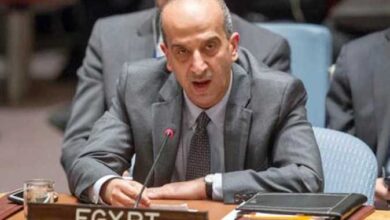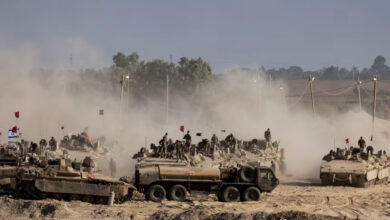Egypt shied away from singling out Israel’s large, but not officially acknowledged nuclear arsenal on Monday, despite Tel Aviv’s worries that Egypt and Turkey will raise the issue at the nuclear security summit scheduled to begin later this evening in the American capital.
On Friday, Israeli Prime Minister Benjamin Netanyahu canceled a visit to Washington to attend the summit of 47 nations that aims to develop measures to keep the world’s plutonium and uranium out of terrorists’ hands.
Israeli media reports quoted several senior Israeli officials as attributing Netanyahu’s decision to information that Egypt and Turkey intended to raise the issue of Israel’s presumed nuclear arsenal during the summit.
“Egypt repeats its calls to save the world from all kinds of nuclear threat,” said Foreign Minister Ahmed Abul Gheit during his opening remarks before the summit. “Egypt will continue pursuing its efforts to create a Middle East nuclear-free zone,” said Abul Gheit in his opening speech that was broadcast by the state-run Middle East News Agency before the summit convenes.
That Egypt’s top diplomat declined to refer to Israel’s nuclear arsenal was surprising to many analysts, who considered the two-day summit a "convenient platform" to mobilize support against Israel.
“I am utterly shocked at Abul Gheit’s remarks,” said Safwat el-Zayat, deputy director of the Middle East Research and Studies Center. “This is a strategic insult to our diplomacy,” Zayat told Al-Masry Al-Youm.
He added that the Egyptian minister might have been “under heavy pressure from the American side not to raise the issue.”
In a televised interview with the official Egyptian television, Abul Gheit said on Sunday that Cairo is “determined to grab Israel from the neck and convince the Western world to press it into joining the Non-Proliferation Treaty.”
By staying outside the 1970 Non-Proliferation Treaty, Israel has not had to forswear nuclear arms nor admit international inspectors to its Dimona reactor, which experts believe has produced plutonium for between 80 and 200 warheads.
Since the early 1990s, Egypt has repeatedly called for the Middle East to be designated a nuclear-free zone. With pressure building up against Iran’s nuclear program, Cairo has emphasized its position that both Israel and Iran’s nuclear ambitions should be dealt with simultaneously.
The Associated Press quoted on Monday US National Security Council spokesperson Ben Rhodes as saying that President Barack Obama would "squeeze" Turkish Prime Minister Recep Tayyip Erdogan during their meeting in Washington.
Rhodes said there were additional "pressing issues” between Washington and Ankara, including normalization of relations between Turkey and Armenia.
Last week Turkey, a key NATO ally, returned its ambassador to Washington. The ambassador had been recalled in protest of a vote by a committee of the US Congress on a resolution that called the World War I-era killing of Armenians a "genocide."
On Sunday, Erdogan said the world is turning "a blind eye" to Israel’s nuclear program, and vowed to raise the issue.




